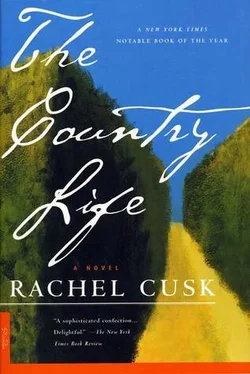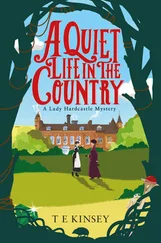There was a pause. I knew that Martin was looking at me, although I didn’t meet his eye. I was beginning to feel rather upset, and sensed strongly that I should bring a stop to the conversation.
‘So why did you marry him?’
‘I made a mistake.’
‘That’s a pretty big mistake, Stel-la.’
‘I know.’
‘How long?’
‘How long what?’
‘How long were you married?’
I trembled on the brink of surrendering this final piece of information; for I feared what would happen when the slope of Martin’s curiosity came to an end. What I was handing over to him was of so much more worth to me than to he himself; and while I could neither decipher nor control the impulse that had made me do so, still I flinched from the possibility that he was, after all, unworthy of my confidence, and that the very part of me which had most sought release would be the part most injured by it. Any form of confession, I now realize, is a process beset by this type of risk. Even when one’s secrets are as besieged as mine were by Martin, the act of divulging them is by necessity selfish, and by implication weak. Revelation requires consent, in however disguised a form; and as such there is no case in which the confessional act can be free from retribution or blame.
‘A week,’ I said.
The starkness of my admission was mitigated somewhat by the fact that Martin did not spring back in triumph or horror at it. I half expected him to burst out laughing as he had done the last time we had discussed this subject, while fearing that he would be shocked and disappointed, and would judge me harshly. He looked surprised, certainly; his expressive, malleable face could not disguise it.
‘What happened?’
‘Oh, I don’t know.’ I looked out of the window, embarrassed. ‘I just had to get away. I felt as if I was dying.’ This seemed rather melodramatic, even in my turbulent state. ‘I expected, I suppose, to feel as if my life had begun,’ I qualified. ‘And instead I knew it had ended. It was as if we’d been tricked and only found out afterwards, when it was too late. That we’d thought, you know, that getting married meant one thing and in fact it meant another. It felt as if we’d been disabled, and that even though the rest of life was ruined we had each other, and couldn’t get away from each other, and even if we did we’d still be disabled.’ There was a pause. ‘Sorry. I didn’t mean it like that. Anyway, we were on honeymoon, and I just came home. I tried to tell Edward, but he didn’t really understand. And then various things happened, and then I left.’
‘On your own?’
‘Yes.’
‘But what did he say when he got back?’ He leaned closer to me and I glimpsed his eyes, shining and perplexed. ‘Was he angry?’
‘I don’t know. Probably. I mean, I didn’t talk to him. I haven’t seen him since then.’
I felt the tremor of something precarious between us, and knew that our fragile acquaintance was being overloaded with information. My own discomfort with the facts I was relating had undoubtedly contributed to this atmosphere of strain; for had I known them better, or even shared them previously with someone else, I might have worn them more easily. As it was I could make no more sense of my own actions than Martin evidently could.
‘Was this — recent?’ he said, slightly awkwardly.
‘Just before I came here. Last week.’
To my surprise, I felt a furtive pressure on my hand. I looked down and realized that Martin had taken it in his own.
‘Poor Stella,’ he said.
I cannot explain why the feeling of human flesh was so unbearable to me in that moment. It was not, I think, embarrassment that caused me to recoil, nor distaste at the pity the gesture conveyed. Rather, it was the loneliness it underscored, the reminder it provided that while I might have found a temporary palliative in company, my unhappiness was my own. Up until that point I had not had an urgent sense of this fact. By keeping myself in a form of oblivion, I had certainly, as Martin pointed out, ‘bottled things up’; but while my problems lay beneath this anaesthetic, I had at least had the advantage of not feeling them. Now, as they awoke and unfurled themselves, they sent out latent shafts of pain, on which the presence of Martin’s hand seemed to be acting as a conductor. I willed myself to keep it there, knowing that I would offend him if I flinched; and yet it was as if I were asking myself to keep my hand in an electric socket.
‘Please!’ I cried eventually, freeing myself from his grasp. I saw him look at me for a moment in horror, as the quiet room echoed with the violence of this action, His rejected hand hung, half-withdrawn, in the air. His face was startled. ‘Don’t ask me any more! I just don’t want to think about it!’ I said, rather too furiously; I thought that my physical reaction would be less conspicuous if backed up by an equally extreme verbal one. ‘Do you understand?’
I must admit that he was very good about it. If he was hurt, he barely showed it, and shortly afterwards we went out to sit in the garden.
We established ourselves beneath a phalanx of trees towards the bottom of the garden, which sent down the occasional light hail of fragrant missiles from the branches above, and in the rustling, deciduous shade I felt an exquisite languor; a sense of almost historical leisure which belonged, I knew, not to me but to the house itself. Martin had brought with him some schoolwork, a battered volume across whose yellowed pages moved a miniature army of arcane symbols; manoeuvres which he appeared to be interpreting with a pencil stub on a pad of white paper in his lap.
‘What’s that?’ I said oafishly, raising myself up on my elbow; for I had assumed a shamelessly horizontal position on the warm grass and had been staring up at the fluttering tracery of leaves against the brilliant blue sky with a mind as scrubbed of thought as a bone.
‘Greek. Translation.’
‘Oh. Is it difficult?’
‘Quite. I suppose I could cheat. Everybody else does. I like it, though.’
‘What’s your school like?’
‘It’s OK.’ A breeze ruffled the pages of his book and he clamped his hand over it. His face was secretive, shifty. ‘It’s normal, I suppose. Better than the centre, anyhow.’
‘Is it a boarding school?’
‘Mostly. There’s a few like me. Day bugs, that is. They’re all complete pillocks. The parentals wanted me to board, but it was too difficult.’
I tried to imagine him in a classroom, amidst the riotous, scruffy jumble of his peers. I knew these boys from my brothers’ childhood, their fluting, patrician voices, their faces hewn of stone above the regulation déshabillé of their uniforms; all that casual, careless perfection incubating in the draughty chambers of a dream.
‘Why did they want you to board?’
‘Dunno.’ He shrugged. ‘Family stuff. We always have. And the journey’s a pain, I suppose.’
‘How long does it take?’
‘Hour and a half each way.’
‘But that’s ridiculous!’
‘What’s the alternative? They didn’t want to send me anywhere else. It isn’t for much longer, anyhow. This’ll be my last year. And besides, there’d have been no point moving me. They’d already paid for all the facilities and stuff.’
‘What facilities?’
‘You know, cripple stuff. Ramps and things.’
‘Your parents paid for them?’
‘Yup.’ He nodded. ‘And a swimming pool. That was a kind of present for the school. Well, it was more of a bribe, actually. They’ll take all the other stuff down once I’m gone.’
‘Why?’
‘Spoils the look of the school. It’s crap anyway. Just tacky crap.’
Читать дальше












